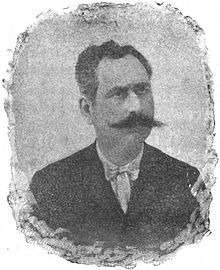Pasquale Penta
Pasquale Penta (born June 16, 1859 in Fontanarosa , † November 23, 1904 in Naples ) was an Italian psychiatrist and criminal anthropologist . In 1896 he founded Italy's first sexual science magazine.
Life
Penta studied medicine and initially became an assistant doctor for clinical propaedeutics with Errico de Renzi in Naples . He did his military service as a doctor at the university hospital there and in the San Stefano prison. Influenced by and based on the criminal anthropology of Cesare Lombroso , Penta developed the idea that crime is pathological in nature. In his later publications he went beyond Lombroso's teaching, insofar as he saw sexual pathologies not only physically but also psychologically , but remained attached to it for his entire life. Alongside Lombroso, he made a name for himself as a supporter of criminal law influenced by social Darwinism .
After his military service, Penta went to the insane asylum run by Gaspare Virgilio and the prison of Aversa as a doctor , where he carried out anthropological studies on inmates and prisoners. He continued his studies even after he moved to the medical department of the prison on Nisida as a doctor .
The head of the Institute for Psychiatry and Neuropathology at the University of Naples, Leonardo Bianchi , brought him to Naples in 1891 as his deputy and also gave Penta his own professorship for criminal anthropology. With the work on the woman murderer Vincenzo Verzeni , I pevertimenti sessuali dell'uomo , published in 1893 , he began to deal more closely with the classification of sexual deviations. In 1896, Penta founded the Archivio delle psicopatie sessuali , the first Italian and second worldwide sexual science journal. In the same year he opened a crime anthropological museum in Naples with around 100 skulls of southern Italian criminals, various photographs and drawings. In 1898 Penta founded the journal La Rivista di Antropologia criminale e Psychiatria forense . The new magazine was less about sexual science than about forensic and legal topics.
Penta died surprisingly after a short illness. Both the Archivio and the Rivista were closed within a year of his death. The Italian doctor and eugenicist Angelo Zuccarelli continued his criminal anthropological museum .
Fonts
- Positivismo e criminalità. Conferenza del dr Pasquale Penta letta il 22 giugno 1890 al circolo giuridico di Napoli. Garda, Ivrea 1890.
- I germi del delirio nei condannati. A. Tocco, Napoli 1892.
- I pervertimenti sessuali nell'uomo e Vincenzo Verzeni strangolatore di donne. Studio biologico. Luigi Pierro, Napoli 1893.
- Sul significato onto-filogenetico del processo frontale nell'uomo. Cav. A. Tocco, Napoli 1894.
- Sulla necessità di applicare il metodo positivo e la ricerca psico-fisica nello studio del diritto. Tip. della tribuna giudiziaria, Napoli 1895.
- Dei pervertimenti sessuali. Caratteri generali, origine e significato… . F.lli Capaccini, Roma 1896.
- Il trattamento razionale delinquente. Rod. Tipografico Cav. A. Tocco, Napoli 1896.
- Origine e patogenesi della inversione sessuale secondo Krafft-Ebing e gli altri autori. Capaccini, Roma 1896.
- Di alcune importanti alterazioni del linguaggio e del loro significato in psichiatria ed in antropologia criminale. A. Tocco, Napoli 1897.
- Influenza degli organi e delle funzioni sessuali. Sul modo di agire del sistema nervoso. F. lli Capaccini, Roma 1897.
- Sulla origine e sulla evoluzione della danza e della musica. , Napoli 1897.
- Sopra un Caso d'Inversione sessuale. Tocco, Napoli 1898.
- Lezioni di psichiatria dettate nell'anno scolastico 1899-1900. , Napoli 1900.
- La simulazione della pazzia e il suo significato antropologico, etnico, clinico e medico-legal. 2nd Edition. Perrella, Napoli 1900; 3. Edition. Perella, Napoli 1905.
- German
- The simulation of mental illness. Stuber, (Kabitzsch), Würzburg 1906.
literature
- Pierre E. Frevert: Pasquale Penta (1859-1904) . In: Volkmar Sigusch , Günter Grau (Hrsg.): Personal Lexicon of Sexual Research . Campus, Frankfurt a. M 2009, pp. 560-562.
| personal data | |
|---|---|
| SURNAME | Penta, Pasquale |
| BRIEF DESCRIPTION | Italian psychiatrist and criminal anthropologist |
| DATE OF BIRTH | June 16, 1859 |
| PLACE OF BIRTH | Fontanarosa |
| DATE OF DEATH | November 23, 1904 |
| Place of death | Naples |
